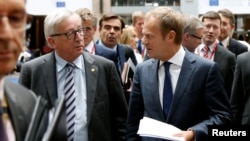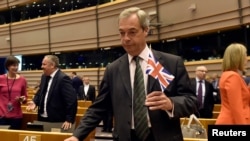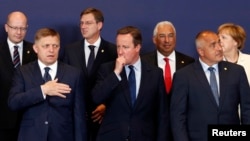European Union leaders have wrapped up an extraordinary summit in Brussels, sending Britain a clear message to get moving on exiting the bloc and to expect no special perks once it does, but struggling over how to make the EU more relevant to its member states' skeptical publics.
“There are too many people in Europe who are unhappy with the current state of affairs and expect us to do better,” acknowledged European Council President Donald Tusk during a final news conference in the Belgian capital Wednesday, adding leaders would meet again in September to discuss the next post-Brexit steps.
The talks Tuesday and Wednesday were unprecedented, as the EU grapples with the fallout of last week’s British referendum that has unleashed disarray in financial markets and British politics, and sparked widespread soul-searching about reforming the 28-member bloc.
“The key issue is to what extent this core group of member states - France, Germany, but also Italy - can persuade governments in eastern and central Europe,” says Marco Incerti, spokesman for the Brussels-based Center for European Policy Studies. “They are the ones that need to get on board if the EU is to move forward.”
At a dinner Tuesday night, EU leaders bid goodbye to outgoing British Prime Minister David Cameron at a glum dinner lightened by a joking tweet, from Czech Europe Minister Tomas Prouza, who said there were no British staples on a menu that included quail salad and poached veal.
“No beans in tomato sauce nor pudding for the #Brexit #EUCO dinner tonight,” he noted.
Pro-Brexit leader booed
During a rowdy session at the European Parliament earlier in the day, European Commission President Jean-Claude Juncker sparred with pro-Brexit leaders, asking, “Why are you here?”
British Independence Party leader Nigel Farage was booed when he told EU lawmakers they’d never had a real job and the EU project was a failure.
“I’ll make one prediction this morning,” he added. “The United Kingdom will not be the last member state to leave the European Union.”
While Cameron has called for strong post-exit ties with the EU, member states warned London cannot be choosy in accessing Europe’s single market.
“If Britain wants to remain in the single market, it must pay the price in all senses of the term,” said French President Francois Hollande.
Leaders also reiterated calls for Britain to act quickly in launching the exit clause, known as Article 50, of the EU's Lisbon Treaty, saying they will hold no Brexit negotiations with London beforehand. No action is expected until a new leader is appointed to replace Cameron, probably in September.
Many are also taking a firm stance that the referendum results must stick, despite a push in Britain for a second vote.
“I want to say very clearly tonight that I see no way to reverse this,” German Chancellor Angela Merkel said Tuesday.
Calls for EU overhaul
Less certain is what the EU will do now. Calls are growing for a fundamental overhaul of a union that grew out of a post-war coal and steel pact. Polls show many Europeans are underwhelmed about the EU today, considering it a meddling bureaucracy undermining national sovereignty.
“Europeans must reinvent themselves and rise to the collective challenges that are considerable,” a group of leading political figures, including former Spanish and Belgian prime ministers, wrote in a petition published in several European newspapers and online.
“I really think there needs to be fundamental reform,” said analyst Bruno Cautres of the Center for Political Research at the Paris Institute of Political Studies, known as Sciences Po, in Paris. “The big problem of the European Union is the legitimacy of EU institutions and their actions.”
Leading up to the summit, influential EU countries Germany, France and Italy laid out a series of priorities from security, to youth and jobs, that the bloc should focus on as it moves forward; None, however, offers new directions.
“Of course, the European Union needs further reforms,” Juncker said, even as he said leaders have ruled out a fundamental overhaul of the group, including a treaty change.
“It’s about speeding up the reforms,” he said, adding, “It’s not about adding new reforms to already existing reforms.”











